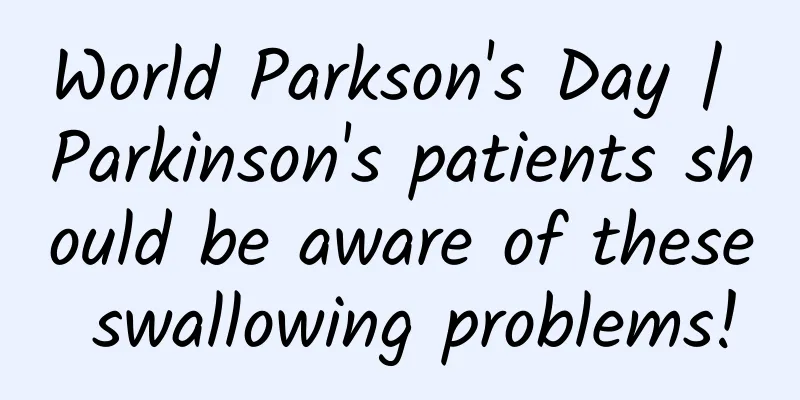World Parkson's Day | Parkinson's patients should be aware of these swallowing problems!

|
Parkinson's disease is a common neurodegenerative disease. Its motor symptoms mainly include resting tremor, muscle rigidity, bradykinesia, and posture and gait disorders, and its non-motor symptoms mainly include cognitive impairment, emotional disorders, sleep symptoms, etc. Swallowing disorders are also common symptoms in Parkinson's patients. Swallowing disorders can lead to various complications in Parkinson's patients, such as malnutrition, dehydration and secondary pneumonia, among which secondary pneumonia is one of the most common causes of death in Parkinson's patients. What are the symptoms of dysphagia in patients with Parkinson's disease? Parkinson's patients may experience freezing of gait, which means obvious hesitation when starting, as if frozen, but once the freezing phenomenon disappears, walking becomes relatively normal. Parkinson's patients may also experience oropharyngeal freezing when swallowing, which is similar to freezing of gait. There may be three manifestations: panic swallowing, tongue muscle tremor or akinesia. Parkinson's patients have abnormal muscle tone, decreased hyoid bone mobility, abnormal head and neck posture, and may have abnormalities in the oral, pharyngeal, and esophageal phases of swallowing. 1. Oral stage - low chewing efficiency and drooling. During the oral stage of swallowing, Parkinson's patients often have tongue muscle tremors and uncoordinated movements, which cause food to roll back and forth repeatedly in the mouth and have difficulty reaching the pharynx. After many repetitions, the tongue has enough strength to push the food bolus backwards on the last try, and the back section of the tongue is lowered to allow food to pass through. Manifestations of oral swallowing disorders in Parkinson's patients also include drooling, food leaking out of the mouth, low chewing efficiency, delayed initiation of tongue movement, food residue in the mouth, and premature leakage of food into the pharynx. 2. Pharyngeal stage - food leakage and aspiration may occur. During the pharyngeal stage of swallowing, Parkinson's disease patients are prone to food residue in the pharynx, or food leakage, or even aspiration of food into the trachea and lungs, resulting in aspiration pneumonia. The normal breathing and swallowing pattern is exhalation-swallowing-exhalation, and exhalation can help expel food that has leaked into the laryngeal vestibule; the proportion of swallowing-inhalation pattern in Parkinson's disease patients increases, which may be related to leakage and aspiration events. 3. Esophageal stage - esophageal dysfunction. Parkinson's disease patients may also experience esophageal dysfunction during the esophageal stage of swallowing, including weakened esophageal motility, esophageal spasm, delayed esophageal transport, abnormal decrease in lower esophageal sphincter muscle tension, and gastroesophageal reflux. In addition to being caused by the disease itself, these abnormalities may also be related to adverse reactions to therapeutic drugs. How to treat dysphagia in patients with Parkinson's disease In clinical practice, different treatment plans are selected according to the different conditions of swallowing disorders in Parkinson's patients. 1. The current focus is on optimizing dopaminergic drug treatment and speech therapy measures, mainly improving oral and pharyngeal swallowing function, and adaptively adjusting dietary strategies. 2. When esophageal spasm causes esophageal dysphagia in Parkinson's disease, injecting botulinum toxin to relax the esophageal sphincter or performing a posterior sphincterotomy may be an effective method. 3. For Parkinson's disease dysphagia with severe aspiration and pneumonia, it is necessary to choose to use a nasogastric tube or percutaneous endoscopic gastrostomy tube to reduce the risk of death. 4. The drug treatment for Parkinson's disease dysphagia mainly includes optimizing dopaminergic drug treatment and botulinum toxin (type A) treatment. The surgical treatment mainly includes surface neuromuscular electrical stimulation, deep brain stimulation, repetitive transcranial magnetic stimulation, etc. 5. In addition, there are non-drug treatments for Parkinson's disease swallowing disorders, such as video-assisted swallowing therapy and expiratory muscle strength training, as well as traditional Chinese medicine treatments such as acupuncture and Chinese medicine. Note: The content of this article refers to "Research Progress in the Assessment of Swallowing Disorders in Patients with Parkinson's Disease" published by Wang Ping et al. in the "Chinese Journal of Neurology" Issue 3, 2023, and "Pathophysiological Mechanisms and Treatment Progress of Swallowing Disorders in Parkinson's Disease" published by Zhang Li et al. in the "Chinese Journal of Neurology" Issue 10, 2018. |
<<: Eating soil is worse than eating duck blood? Are “lung-clearing” foods really useful?
Recommend
Has your baby turned into a "minion"? The truth and misunderstanding of neonatal jaundice
Author: Gao Hong, deputy chief nurse of the Secon...
7 ways to dress appropriately and charmingly
There are some ways you can dress modestly and ye...
What kind of tea is good for gynecological inflammation?
Gynecological inflammation is a common disease am...
Does cervical erosion of degree 3 affect fertility?
For cervical erosion, depending on its severity, ...
Why do my breasts swell and hurt before my period?
Menstruation is a physiological circulatory cycle...
Craving for spicy and sour food during early pregnancy
In the early stages of pregnancy, not only do you...
Benefits of drinking red bean soup during menstruation
When a woman's menstrual period comes, everyo...
Is it okay to have a second child at the age of 40?
Is it good for a woman to have a second child at ...
Uncovering the mysteries of chronic diseases: common types and the root causes
Uncovering the secrets of chronic diseases: commo...
Itch in the genitals after moxibustion
Nowadays, more and more people are doing moxibust...
Is it painful to insert the ring or to remove it?
Many people choose to use the IUD for contracepti...
How to treat female vulvar leukoplakia
Vulvar leukoplakia is a common gynecological dise...
What vitamins to supplement during menopause
No matter men or women, they will quickly enter m...
What are some extreme sports for women?
Extreme sports are now not only loved by some you...
Can this much-hyped supplement really make your hair darker?
gossip “Taking tyrosine supplements can really ma...









